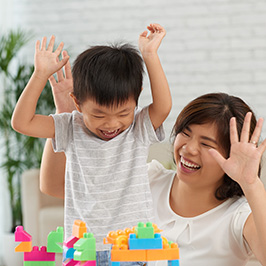Thinking about aba potty training a child can be an overwhelming feeling. For parents of children with various exceptionalities, taking on this challenge could be an ample undertaking. It takes our kiddos with exceptionalities longer to learn day-to-day skills. Needless to say, it will take a little extra time to accomplish this goal. Having the right tools and resources will help the process go smoother. For this reason, traditional approaches to toilet training may not always be helpful. This is where applied behavioral analysis (ABA) comes into play.
Because of the specific needs of each child and family, our potty-training program is individually designed. Spending the time needed to understand your child and family’s strengths and weaknesses is imperative for the success of this process. We utilize these strengths to provide positive reinforcement and focus heavily on areas of weakness so these, too, can become strengths.
Many parents are unsure about when to start toilet training or "potty training." Not all kids are ready at the same age, so it's essential to watch your child for signs of readiness, such as stopping an activity for a few seconds or clutching his or her diaper. Children with autism or other exceptionalities may not express such signs or readiness.
There are plenty of popular methods for toilet-training our children. But not only methods based on science, surprisingly, there are also myths and misconceptions! Separating fact from fiction is not always easy where potty training is concerned. One example of a myth is that your child should be toilet-trained at a specific age. Children develop at different times and in different ways.
“The first step is always the hardest.” this quote applies to making the decision to start the potty-training process. As parents, we often contemplate the things surrounding this decision like, “are they ready?”, “do we have the time that we need?”, “vacations are coming!”, “Is this a sign?”, etc. Having the right support will help you commit to your decision and finally get to say bye-bye diapers!
Understanding the pros and cons of this process will be the key to knowing whether doing daytime and nighttime training simultaneously or one after the other works best for your family. Having the guidance of ABA providers will help with the decision-making process and upcoming challenges in this phase of your child’s life.
We believe that well-established procedures result in a high-quality service. We invest the time needed to gather the necessary information to produce the best plan of care for all the children we serve.
Our onboarding team will contact you to gather information and documents needed for ABA benefits verification and intake.
After the consultation, we will ask for authorization to carry out an initial assessment. A BCBA will then conduct the assessment upon getting an authorization, if needed.
Following the initial assessment, the BCBA will create a treatment plan based on your child’s needs to be reviewed by you. This treatment plan will then be subject to authorization before it can be implemented.
The approved treatment plan will be implemented by a Registered Behavior Technician under the supervision of a BCBA on a scheduled basis depending on the needs of your child.
Parents play a vital role in a child’s life and ABA program. This training aims to empower you, caregivers, to address challenging situations and continue reinforcing outside therapy hours.
RBTs are supervised regularly and frequently by a BCBA to ensure quality services. BCBAs also utilize this time to observe and evaluate your child and help to solve problems with goals that are making slow progress.

I am very happy with the service. Mindful Sprouts helped me during a very difficult time. everyone is very responsive. ABA totally helped and everyone is doing an amazing job! I know it is a work in progress, but we will get there.
Catalina
Boca Raton, Florida